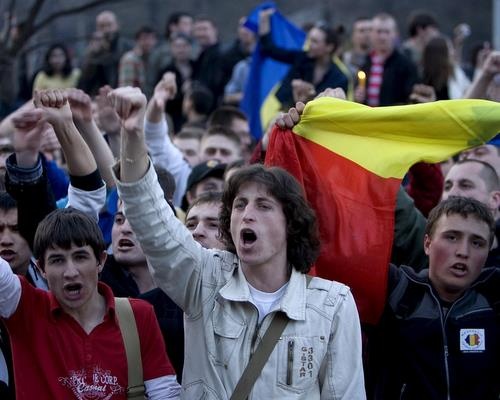
Moldova on the Brink of Constitutional Crisis
Publication: Eurasia Daily Monitor Volume: 6 Issue: 97
By:

With its underdeveloped multi-party system and state institutions, dysfunctional law-enforcement and internal security apparatus, budget revenues drying up amid an international financial crisis, and the unresolved Transnistria conflict simmering on the back burner, Moldova now faces the risk of a constitutional crisis.
The nominal Communist Party, election winner on April 5 for the third consecutive time, holds 60 seats in the new parliament. Three nominally liberal parties – Liberal, Liberal-Democrat, and Our Moldova – hold the other 41 seats. Two days after the elections, anti-authority youth mobs (including, but not limited to sympathizers of the opposition parties) devastated the presidential and parliament buildings and set them on fire. That assault, the brutal police response that followed, and inflammatory rhetoric continuing on all sides have produced a post-election deadlock.
The three opposition parties are challenging the validity of the election results and taking only a minimal part in the new parliament’s work thus far. Parliament cannot fully constitute itself and function as long as the opposition withholds cooperation. Constitutionally, Moldova is a parliamentary republic, its president elected by the legislature. President Vladimir Voronin has completed his second, final term of office and may only continue until June 7 as acting president. The old government must continue as caretaker, pending the election of a new head of state by that deadline, failing which the parliament is dissolved and new elections must be held (Moldpres, Basapres, May 18, 19).
Rhetorically at least, the opposition is demanding new parliamentary elections. These would prolong the legislative vacuum and executive-branch limbo into August or September, amid a rapidly deteriorating economic situation and tension-filled atmosphere in Chisinau.
In the post-election period, a monitored recount of 100 percent of the ballots cast country-wide has fully confirmed the election results; a 95 percent check of voter registration lists by the opposition (admittedly short of staff and expertise) has failed to yield any evidence of fraud; and the constitutional court (whose decisions are final and not subject to appeal) has validated the election results. The opposition parties nevertheless, insist that the election returns were fraudulent.
That contention clashes with the European observation mission’s largely positive assessment of Moldova’s elections. The challenge resembles that in Georgia, where opposition parties also reject Western observers’ evaluation of last year’s elections and demand new elections to be held. Thus the whole election observation mechanism, developed in the ex-Soviet realm by the OSCE and EU, is threatened from two opposite directions: by the autocratic Kremlin, which has made it impossible for Western election observers to operate in Russia, and by Georgian and Moldovan oppositionists, who openly defy Western observers’ assessments of elections.
Moldova’s opposition parties threaten to deprive the new parliament of the necessary quorum for electing the new head of state. Behind the public bluster, however, the opposition parties are in fact divided or hesitant on this issue.
The 60-strong parliamentary majority needs just one more vote for its candidate to be elected. Under the Moldovan constitution, the head of state is elected by parliament in secret balloting with at least 61 votes in favor. If parliament fails to elect a head of state after four rounds of balloting, the acting president dissolves the parliament and calls new elections (Basapres, Moldpres, May 18, 19).
Thus, the opposition can force the holding of new parliamentary elections simply by blocking the presidential election in the chamber. Alternatively, opposition parties or elements within them can vote for the majority party’s presidential nominee as part of a political trade-off on this issue and continue opposing government policies afterward. On this and other major issues, decision-making power ultimately rests with the chairmen and vice-chairmen of the opposition parties.
Of the three opposition parties, the Liberals (a pro-Romania irredentist party) seem determined to block the presidential election and force new parliamentary elections. Party chairman Mihai Ghimpu and vice-chairman Dorin Chirtoaca, an uncle-and-nephew duo, are known as rigid and militant personalities, with Chirtoaca now also beholden to a social base of student and teenage protest groups deployable in Chisinau.
Among Liberal-Democrats (a moderately pro-Romanian, oligarch-supported party), chairman Vlad Filat has the track record of a deal-making politician, including his controversial vote for Voronin in the 2005 presidential election. Such a move seems very difficult to replicate in the current atmosphere, however. The party’s vice-chairman, Alexandru Tanase, is acting in a spirit of relentless confrontation and seems to restrict Filat’s leeway.
The third opposition party, Our Moldova (led by mid-level nomenklatura survivors from the final Soviet years) is cautiously signaling that it could provide a few crucial votes to elect the head of state and avoid new parliamentary elections. Party chairman Serafim Urecheanu and vice-chairman Veaceslav Untila had led futile efforts in 2005 to block Voronin’s election and force new parliamentary elections. This time, however, Our Moldova is far from confident that it would return to parliament if new elections are held.




